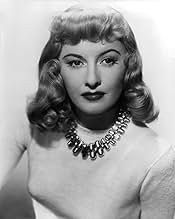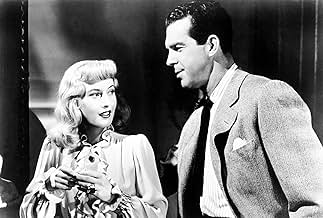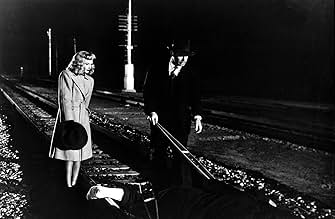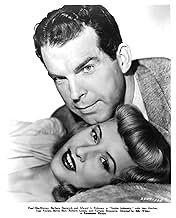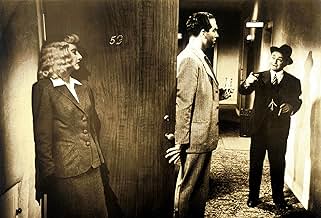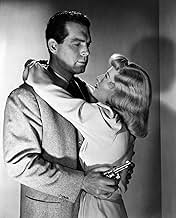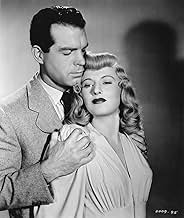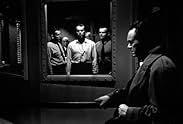Ein Versicherungsvertreter lässt sich zur Planung eines Mordes und Versicherungsbetrugs überreden, der schließlich den Verdacht eines Versicherungsdetektivs erregt.Ein Versicherungsvertreter lässt sich zur Planung eines Mordes und Versicherungsbetrugs überreden, der schließlich den Verdacht eines Versicherungsdetektivs erregt.Ein Versicherungsvertreter lässt sich zur Planung eines Mordes und Versicherungsbetrugs überreden, der schließlich den Verdacht eines Versicherungsdetektivs erregt.
- Regie
- Drehbuch
- Hauptbesetzung
- Für 7 Oscars nominiert
- 5 Gewinne & 9 Nominierungen insgesamt
Lev Abramov
- Stage Hand
- (Nicht genannt)
James Adamson
- Pullman Porter
- (Nicht genannt)
John Berry
- Bit Part
- (Nicht genannt)
Raymond Chandler
- Man Reading Magazine Outside Keyes' Office
- (Nicht genannt)
Edmund Cobb
- Train Conductor
- (Nicht genannt)
Kernan Cripps
- Conductor
- (Nicht genannt)
Betty Farrington
- Nettie - Dietrichsons' Maid
- (Nicht genannt)
Bess Flowers
- Norton's Secretary
- (Nicht genannt)
Zusammenfassung
Reviewers say 'Double Indemnity' is acclaimed for Billy Wilder's direction, standout performances by Fred MacMurray, Barbara Stanwyck, and Edward G. Robinson, and its pioneering film noir style. The intricate plot, dark themes, and exploration of human nature are often lauded. Voice-over narration, sharp dialogue, and unique cinematography heighten its suspense. Despite minor pacing issues and plot inconsistencies, its impact on the noir genre and cinema is significant. The lead characters' chemistry and moral complexities are noted for enhancing dramatic tension.
Empfohlene Bewertungen
Barbara Stanwyck changed the trajectory of her career with her ruthless, icy performance here. Fred MacMurray, however, would never again allow himself to duplicate anything similar to Walter Neff's troubled, doomed portrayal again on screen. Playing against their dark alliance, it is left to Edward G. Robinson to win the audience over as he struggles to shed light on the insurance fraud and murder.
This script should be studied by anyone who plans to write for TV or movies. Note the significant changes Wilder and Chandler made from James Cain's original novel - changes Cain admitted were improvements.
Especially worthy of mention is the level of artistry displayed in the final minutes when, after an hour and a half of of bitter nastiness, Wilder gives us just the smallest spoonful of sugar that wraps everything up perfectly. There's almost something criminal when evil is such a treat to watch.
No need to recap the plot or echo consensus points.
From the minute he sees her slinking down the stairs in that spangled ankle bracelet, he's hooked. Walter Neff's already boarded that long, lonely trolley down the one-way track. Yes indeed, sultry Phyllis appears to be just the ticket he's been looking for. Great noir classic. All in all, Neff should have paid attention to that other member of the oddball triangle. Old man Keyes may be a born cynic, but despite himself, he's a father figure looking for a son to take his place, and warning Neff about the "Margie's" of the world. What he doesn't know is that this "Margie" definitely doesn't drink out of a bottle. What's more, Neff's already chosen to ride with the flashy crowd, get out of that dumpy apartment, and get into Phyllis's vicious little insurance swindle. As Keyes tellingly remarks, "You're not smarter than the rest, Walter, just a little taller." I like to think that Walter finally realizes his folly in that brilliant final scene, even if it is too late. Still, the film's cynical veneer is misleading. Because beneath all the deceits, betrayals, and ironies, lies a lighted match and one of the odder father-son relationships in Hollywood annals.
From the minute he sees her slinking down the stairs in that spangled ankle bracelet, he's hooked. Walter Neff's already boarded that long, lonely trolley down the one-way track. Yes indeed, sultry Phyllis appears to be just the ticket he's been looking for. Great noir classic. All in all, Neff should have paid attention to that other member of the oddball triangle. Old man Keyes may be a born cynic, but despite himself, he's a father figure looking for a son to take his place, and warning Neff about the "Margie's" of the world. What he doesn't know is that this "Margie" definitely doesn't drink out of a bottle. What's more, Neff's already chosen to ride with the flashy crowd, get out of that dumpy apartment, and get into Phyllis's vicious little insurance swindle. As Keyes tellingly remarks, "You're not smarter than the rest, Walter, just a little taller." I like to think that Walter finally realizes his folly in that brilliant final scene, even if it is too late. Still, the film's cynical veneer is misleading. Because beneath all the deceits, betrayals, and ironies, lies a lighted match and one of the odder father-son relationships in Hollywood annals.
This is one of the best films of all time, not necessarily because of its story but because of the acting, direction, cinematography, lighting, and just the way that the story itself was told. At the time the film was released, the idea of revealing who the killer was in the opening scene was virtually unheard of, but it ended up being very effective because it allowed the audience to concentrate more on other elements of the film, which was the goal of Billy Wilder, the director. Instead of trying to figure out who the perpetrator was, there is more emphasis on how the crime was pulled off, what mistakes were made during the murder, who betrayed who, how close Barton Keyes (the insurance investigator) was getting to solving the case, and, probably most importantly, what kind of person Walter Neff is and whether or not sympathy should be felt toward him.
Barbara Stanwyck, in one of the most remembered performances of her extensive career, represents (with nearly flawless ease) the cold and ruthless manipulator who has no difficulty in ruining other people's lives in various ways (including death, if necessary) in order to get what she wants. Known in the film community as the `femme fatale,' this is someone who uses her sexual prowess, seductiveness, and emotional detachment to drag an unsuspecting person (generally an interested man) into a scheme from which she is expected to benefit heavily and he is most likely headed for destruction. In these types of films, the man often either finds his life in ruins or ends up dead, as is often (but not always) also the case with the fate of the femme fatale.
Barbara Stanwyck (as Phyllis Dietrichson, the murderous femme fatale in Double Indemnity) and Fred MacMurray (as Walter Neff, her victim'), have amazing chemistry on screen. Their attraction is incredibly well portrayed, and the development of their relationship with each other is so convincing that what happens between them almost seems normal. Besides that, their mutually calculated interaction, although it seems at first like it has been rehearsed endlessly and ultimately brought unconvincingly to the screen, is exactly as it was meant to be, because it represents each character's intentions, even very subtly foreshadowing their future betrayals against each other. Phyllis has gone through every word she ever says to Walter in her head. She has practiced what she wants to say when she brings up the idea of life insurance to Walter in the beginning and she knows what she wants to say whenever they interact with each other because she has been planning for quite some time the prospect of murdering her husband in order to collect his fortune. Walter, conversely, methodically makes amorous advances as though this is something that he does regularly, and then ultimately he also plans out his conversations with Phyllis because he begins to suspect her and is sure to tell her only what he wants her to hear. This seemingly stiff dialogue brilliantly represents Phyllis and Walter's precise (and sinister) intentions, and it's quick pace creates a feeling of urgency and restlessness.
Probably the most fascinating and entertaining actor in the film, Edward G. Robinson, plays Barton Keyes, Walter's friend and employer at the insurance company where he works. Keyes is a very suspicious man who closely investigates the insurance claims which come into the company, having a striking history of accurately isolating fraudulent claims and throwing them out. His handling of Phyllis's (and Walter's, technically) claim and the way that he gets closer and closer to the truth create a great atmosphere of tension and drama.
Double Indemnity is nearly flawless. From the shocking and unexpected beginning to the already known but still surprising end, the audience is held rapt by the excellent performances, the brilliant and imaginative direction, and the flawlessly created atmosphere. This is excellent, excellent filmmaking, and is a classic film that should not be missed.
Barbara Stanwyck, in one of the most remembered performances of her extensive career, represents (with nearly flawless ease) the cold and ruthless manipulator who has no difficulty in ruining other people's lives in various ways (including death, if necessary) in order to get what she wants. Known in the film community as the `femme fatale,' this is someone who uses her sexual prowess, seductiveness, and emotional detachment to drag an unsuspecting person (generally an interested man) into a scheme from which she is expected to benefit heavily and he is most likely headed for destruction. In these types of films, the man often either finds his life in ruins or ends up dead, as is often (but not always) also the case with the fate of the femme fatale.
Barbara Stanwyck (as Phyllis Dietrichson, the murderous femme fatale in Double Indemnity) and Fred MacMurray (as Walter Neff, her victim'), have amazing chemistry on screen. Their attraction is incredibly well portrayed, and the development of their relationship with each other is so convincing that what happens between them almost seems normal. Besides that, their mutually calculated interaction, although it seems at first like it has been rehearsed endlessly and ultimately brought unconvincingly to the screen, is exactly as it was meant to be, because it represents each character's intentions, even very subtly foreshadowing their future betrayals against each other. Phyllis has gone through every word she ever says to Walter in her head. She has practiced what she wants to say when she brings up the idea of life insurance to Walter in the beginning and she knows what she wants to say whenever they interact with each other because she has been planning for quite some time the prospect of murdering her husband in order to collect his fortune. Walter, conversely, methodically makes amorous advances as though this is something that he does regularly, and then ultimately he also plans out his conversations with Phyllis because he begins to suspect her and is sure to tell her only what he wants her to hear. This seemingly stiff dialogue brilliantly represents Phyllis and Walter's precise (and sinister) intentions, and it's quick pace creates a feeling of urgency and restlessness.
Probably the most fascinating and entertaining actor in the film, Edward G. Robinson, plays Barton Keyes, Walter's friend and employer at the insurance company where he works. Keyes is a very suspicious man who closely investigates the insurance claims which come into the company, having a striking history of accurately isolating fraudulent claims and throwing them out. His handling of Phyllis's (and Walter's, technically) claim and the way that he gets closer and closer to the truth create a great atmosphere of tension and drama.
Double Indemnity is nearly flawless. From the shocking and unexpected beginning to the already known but still surprising end, the audience is held rapt by the excellent performances, the brilliant and imaginative direction, and the flawlessly created atmosphere. This is excellent, excellent filmmaking, and is a classic film that should not be missed.
This is one of the best-liked classic films of all time and I am among that large group of fans as well.
Few movies have ever had dialog this entertaining.....at least the conversations between Barbara Stanwyck and Fred MacMurray. I think it's a big appeal to this movie, except to younger folks who look at it as "cheesy."
I read the book, Double Indemnity written by James Cain, and was surprised that the film's snappy dialog was not in it. This is one of the rare times when the movie was far better than the book. That's not a shock after you find out that literary giant Raymond Chandler and Hall Of Fame director Billy Wilder combined to write the screenplay,
For a murder/suspense story, there is very little action, almost none, yet there are no boring lulls. The three main actors - Stanwyck, MacMurray and Edward G. Robinson, are what make this so good.
MacMurray's narration is fun to hear as he tells the story in flashback, from the beginning by dictating into an old Dictaphone to his co-worker Robinson. The latter is almost mesmerizing in his performance, the way he delivers his lines. He can even make a speech about something as boring as insurance and still keep you riveted to the screen.
Stanwyck was no sex symbol (at least to me) but she looked great here in the most seductive of 1940s clothing and, like Robinson, has a distinctive voice and accent that keeps your attention.
This film was the inspiration for the 1980 movie, "Body Heat," starring William Hurt and Kathleen Turner. That, too, was a very, very good movie....but not many films are in the class of this one.
Few movies have ever had dialog this entertaining.....at least the conversations between Barbara Stanwyck and Fred MacMurray. I think it's a big appeal to this movie, except to younger folks who look at it as "cheesy."
I read the book, Double Indemnity written by James Cain, and was surprised that the film's snappy dialog was not in it. This is one of the rare times when the movie was far better than the book. That's not a shock after you find out that literary giant Raymond Chandler and Hall Of Fame director Billy Wilder combined to write the screenplay,
For a murder/suspense story, there is very little action, almost none, yet there are no boring lulls. The three main actors - Stanwyck, MacMurray and Edward G. Robinson, are what make this so good.
MacMurray's narration is fun to hear as he tells the story in flashback, from the beginning by dictating into an old Dictaphone to his co-worker Robinson. The latter is almost mesmerizing in his performance, the way he delivers his lines. He can even make a speech about something as boring as insurance and still keep you riveted to the screen.
Stanwyck was no sex symbol (at least to me) but she looked great here in the most seductive of 1940s clothing and, like Robinson, has a distinctive voice and accent that keeps your attention.
This film was the inspiration for the 1980 movie, "Body Heat," starring William Hurt and Kathleen Turner. That, too, was a very, very good movie....but not many films are in the class of this one.
Vintage Noir Film with gritty interpretation , atmospheric settings , crackling dialogue throughout and powerhouse filmmaking . This Billy Wilder's first thriller is one of the finest Noir film ever made . A scheming wife (Barbara Stanwyck) lures an insurance salesman (Fred MacMurray , though Alan Ladd, George Raft, Brian Donlevy, James Cagney, Spencer Tracy, Gregory Peck, and Fredric March were all up for the leading role) into helping murder her husband and then declare it an accident . Both of whom concoct a twisted scheme to collect the benefits of a insurance policy . As the hubby's policy contains a clause that states that if the husband's death caused by a moving train the policy pays double face value . The investigator's boss (Edward G. Robinson) , not knowing his colleague is involved in it , suspects murder and sets out to prove it .
This first-rate and entertaining American classic Noir film draws its riveting tale and power from the interaction of finely drawn roles as well as drama , emotion and moody atmosphere . This classic mystery thriller follows James M Cain's book fairly closely otherwise . Twisted film Noir about murder , troubled relationships , treason , dark secrets , including an unforgettable dialog ; being based on the James M Cain's novel , which in turn was based on the true story of Ruth Snyder, the subject of a notorious 1920s murder trial , being screen-written by the prestigious Raymond Chandler and the same Billy Wilder . However , Billy Wilder and Raymond Chandler did not get along well while writing this film's script, a process that was apparently filled with arguments . As Billy Wilder didn't really get on with the famous novelist whose constant drinking irritated the director . It packs a good realization , an original script , haunting atmosphere , intriguing events ; for that reason madness and murder prevail . Fred MacMurray is superb as insurance salesman coerced into murder plot and Barbara Stanwick as predatory and alluring Femme Fatale is magnificent . Here his colleague Edward G Robinson is extraordinary and as cool as ever ; he plays as the astute and stubborn investigator , his scenes with Fred MacMurray are awesome and at their best . But Edward G. Robinson's initial reluctance to sign on largely stemmed from the fact he wasn't keen on being demoted to third lead . Good support cast formed by notorious secondaries such as Porter Hall , Tom Powers , Jean Heather , Byron Barr and Fortunio Bonanova . And Raymond Chandler's cameo , this marks the only film appearance of screenwriter and novelist Raymond Chandler .
Exciting as well as complex film , possessing a mysterious and fascinating blend of gripping thriller , serenity , baroque suspense in which especially stands out the portentous performances , evocative cinematography in black and white by John F. Seitz and thrilling musical score by the classic Miklos Rozsa . The motion picture was stunningly directed by the great Billy Wilder , as the American Film Institute ranked this as the #29 Greatest Movie of All Time . The film was nominated for 7 Academy Awards but lost out on the night to Going my way (1944) by Leo McCarey. It got a deep inspiration for other films , it is particularly obvious for ¨Body heat¨ by Lawrence Kasdan with William Hurt , Kathleen Turner and Richard Crenna . Remade for TV in 1954 by Buzz Kulik with Frank Lovejoy , Ray Collins and Laraine Day , and 1973 TV remake of the 1940s classic by Jack Smight with Richard Crenna , Samantha Eggar , and Robert Webber .
This first-rate and entertaining American classic Noir film draws its riveting tale and power from the interaction of finely drawn roles as well as drama , emotion and moody atmosphere . This classic mystery thriller follows James M Cain's book fairly closely otherwise . Twisted film Noir about murder , troubled relationships , treason , dark secrets , including an unforgettable dialog ; being based on the James M Cain's novel , which in turn was based on the true story of Ruth Snyder, the subject of a notorious 1920s murder trial , being screen-written by the prestigious Raymond Chandler and the same Billy Wilder . However , Billy Wilder and Raymond Chandler did not get along well while writing this film's script, a process that was apparently filled with arguments . As Billy Wilder didn't really get on with the famous novelist whose constant drinking irritated the director . It packs a good realization , an original script , haunting atmosphere , intriguing events ; for that reason madness and murder prevail . Fred MacMurray is superb as insurance salesman coerced into murder plot and Barbara Stanwick as predatory and alluring Femme Fatale is magnificent . Here his colleague Edward G Robinson is extraordinary and as cool as ever ; he plays as the astute and stubborn investigator , his scenes with Fred MacMurray are awesome and at their best . But Edward G. Robinson's initial reluctance to sign on largely stemmed from the fact he wasn't keen on being demoted to third lead . Good support cast formed by notorious secondaries such as Porter Hall , Tom Powers , Jean Heather , Byron Barr and Fortunio Bonanova . And Raymond Chandler's cameo , this marks the only film appearance of screenwriter and novelist Raymond Chandler .
Exciting as well as complex film , possessing a mysterious and fascinating blend of gripping thriller , serenity , baroque suspense in which especially stands out the portentous performances , evocative cinematography in black and white by John F. Seitz and thrilling musical score by the classic Miklos Rozsa . The motion picture was stunningly directed by the great Billy Wilder , as the American Film Institute ranked this as the #29 Greatest Movie of All Time . The film was nominated for 7 Academy Awards but lost out on the night to Going my way (1944) by Leo McCarey. It got a deep inspiration for other films , it is particularly obvious for ¨Body heat¨ by Lawrence Kasdan with William Hurt , Kathleen Turner and Richard Crenna . Remade for TV in 1954 by Buzz Kulik with Frank Lovejoy , Ray Collins and Laraine Day , and 1973 TV remake of the 1940s classic by Jack Smight with Richard Crenna , Samantha Eggar , and Robert Webber .
Wusstest du schon
- WissenswertesAuthor James M. Cain later admitted that if he had come up with some of the solutions to the plot that screenwriters Billy Wilder and Raymond Chandler did, he would have employed them in his original novel.
- PatzerWhen Walter first kisses Phyllis, a wedding ring can be seen on Walter's hand. Fred MacMurray was married, and the ring was not noticed until post-production.
- Zitate
[last lines]
Walter Neff: Know why you couldn't figure this one, Keyes? I'll tell ya. 'Cause the guy you were looking for was too close. Right across the desk from ya.
Barton Keyes: Closer than that, Walter.
Walter Neff: I love you, too.
- Crazy CreditsOpening credits are shown over a silhouette of a man on crutches, walking toward the camera.
- VerbindungenEdited into Tote tragen keine Karos (1982)
Top-Auswahl
Melde dich zum Bewerten an und greife auf die Watchlist für personalisierte Empfehlungen zu.
Details
- Erscheinungsdatum
- Herkunftsland
- Offizieller Standort
- Sprache
- Auch bekannt als
- Pacto de sangre
- Drehorte
- 6301 Quebec Drive, Hollywood Hills, Los Angeles, Kalifornien, USA(Dietrichson house)
- Produktionsfirma
- Weitere beteiligte Unternehmen bei IMDbPro anzeigen
Box Office
- Budget
- 927.262 $ (geschätzt)
- Weltweiter Bruttoertrag
- 21.026 $
- Laufzeit1 Stunde 47 Minuten
- Farbe
- Seitenverhältnis
- 1.37 : 1
Zu dieser Seite beitragen
Bearbeitung vorschlagen oder fehlenden Inhalt hinzufügen




